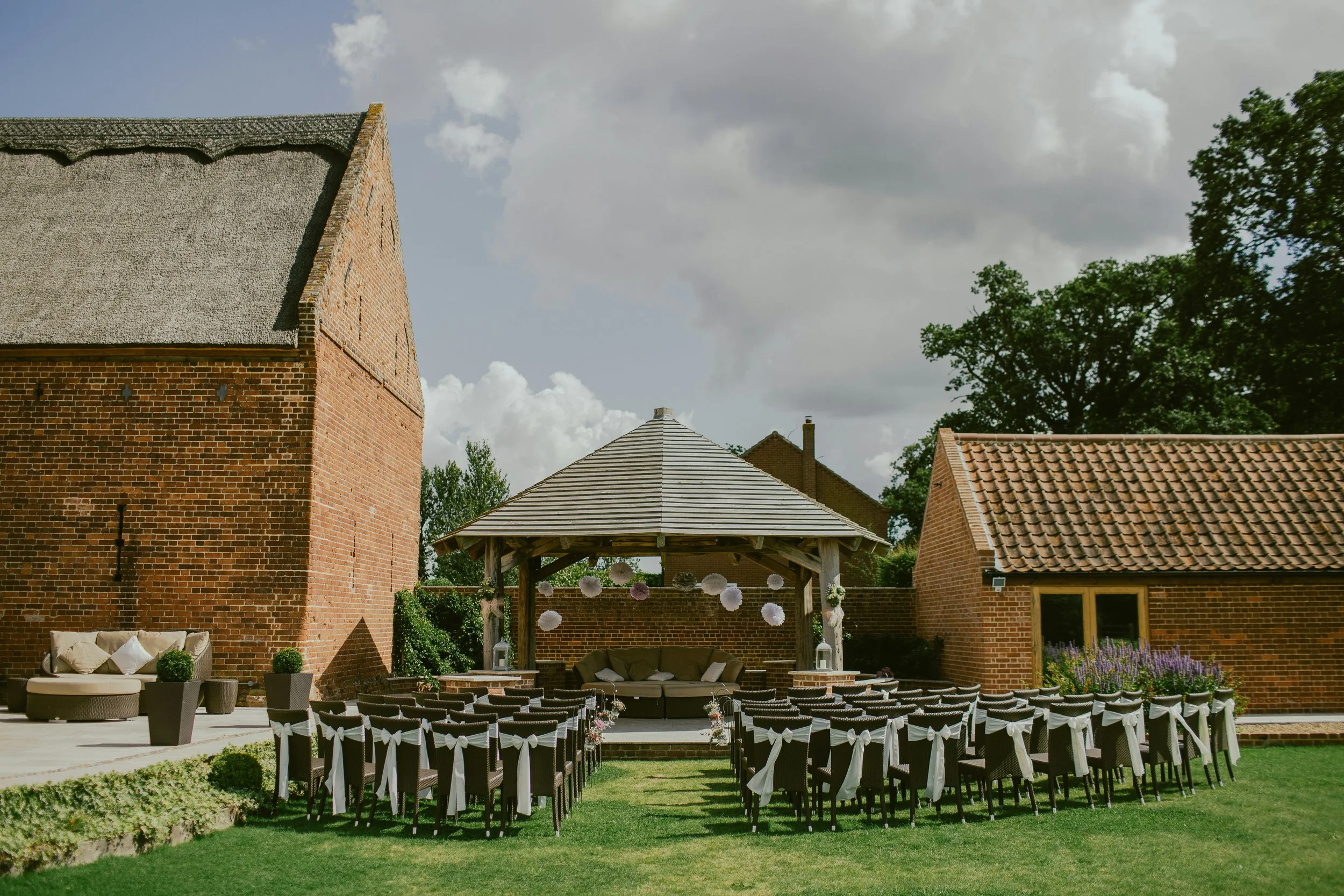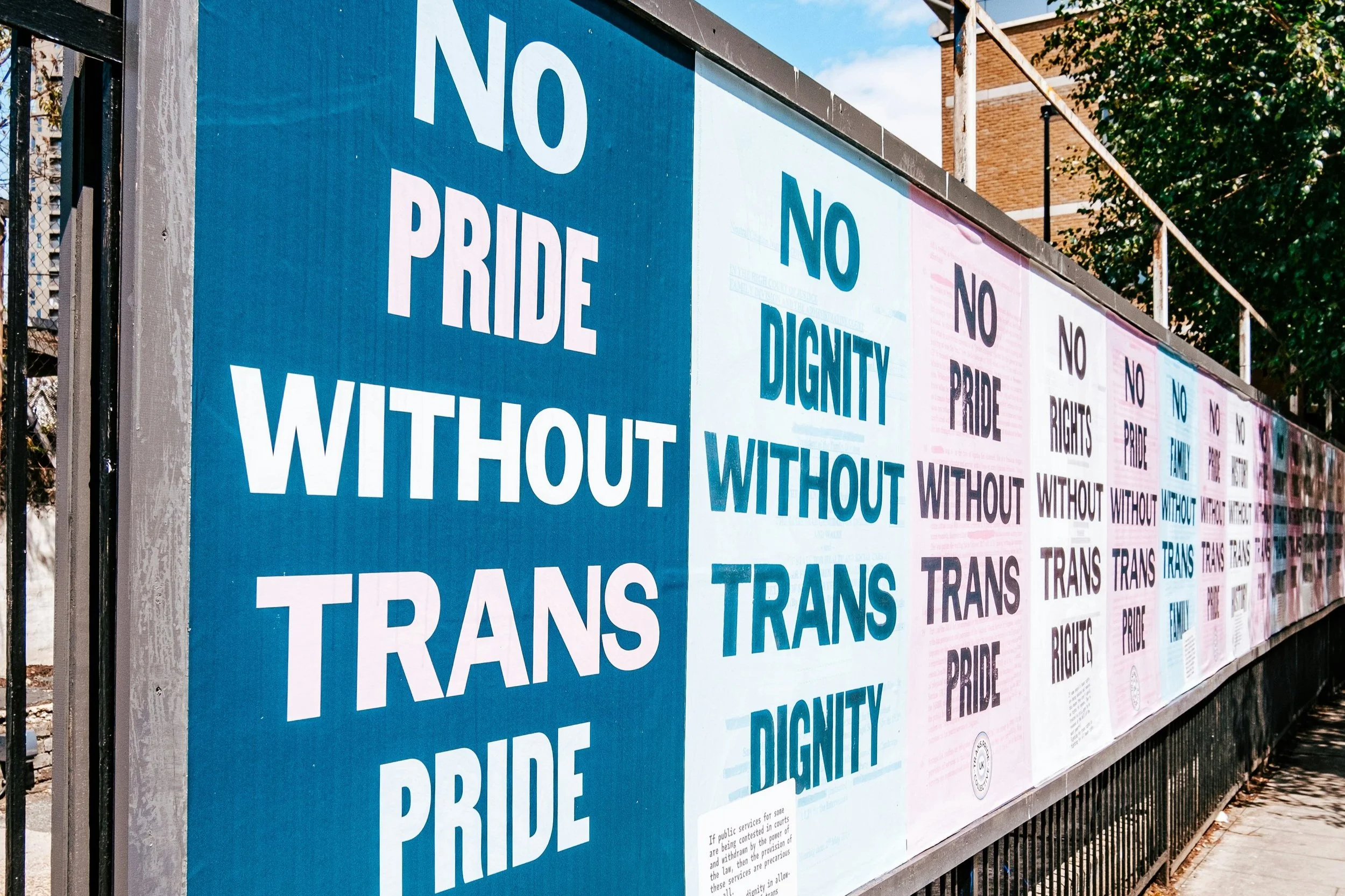Getting married as a trans/nonbinary person in the UK
Welcome to Wedding Queeries, my blog post series about navigating the wedding industry for LGBTQ+ people!
It’s Trans Awareness Week (13 - 19 November), so what better time to talk about getting married as a trans/nonbinary person?
I’m a nonbinary wedding celebrant – and I got married myself earlier this year – so I have lots of thoughts on this!
Are you a trans/nonbinary person who is engaged or thinking about getting married, and wondering what the process will be like? If so, this post is for you! Below I’ll share what the situation is like for trans and nonbinary people who want to get married in the UK, and why working with a celebrant for your wedding ceremony is absolutely crucial!
Legal wedding ceremonies for trans and nonbinary people
Are you looking to have a marriage that is recognised by law?
If so, you will need to have a legal ceremony conducted by a registrar. What happens in this ceremony is different depending on where you decide to have your ceremony.
Legal wedding ceremonies in England and Wales
In England and Wales, the ceremony is legally required to have wording (“declaratory and contracting words”) that is unfortunately gendered, and there’s no way to avoid it in a legal ceremony. You also need to use your full legal name, so if you’re going by a different name but haven’t yet changed it on your passport, that may be an issue.
The “contracting words” have to include either “wife” or “husband”. One example of contracting words is “I [name], take you [name], to be my wedded wife (or husband)". Which term your partner is allowed to use for you is very likely to depend on what it says on your birth certificate – unless you luck out with a nice registrar! If you’re a binary trans person but you haven’t got a Gender Recognition Certificate (GRC) – and it’s very understandable why you wouldn’t have one, given how difficult it is to get one in this country – even if you’ve transitioned medically, even if everyone in your life knows you as your affirmed gender, you would still have to go with “wife” if you were assigned female at birth, and “husband” if you were assigned male at birth.
And of course, if you’re nonbinary and you don’t identify as male or female, and you don’t intend to describe yourself as a “husband” or “wife”, there’s no gender-neutral option for you.
So during your legal ceremony, unless you’re a binary trans person who has a GRC, your partner simply has to misgender you, and you cannot marry as who you really are.
And that is awful. It means that some trans and nonbinary people may choose not to get married legally – because to do that, they would have to pretend to be someone they’re not during this incredibly significant moment of their lives. Their partner would be forced to call them something they never ever would outside of the ceremony. And the idea of having to go through that in front of all their wedding guests is unthinkable!
Legal wedding ceremonies in Scotland
In Scotland, the situation is thankfully less archaic!
I’m nonbinary, and I got married in Scotland. The Scottish marriage notice form gave me these options to select from: “bride”, “groom”, “bridegroom”, or “no designation”. I talked about it with my partner, and I decided to tick “bridegroom”, because even though it’s historically just the longer form of the word “groom”, nobody really uses “bridegroom” that much anymore, and it seemed to us like a fun gender-neutral combination of “bride” and “groom” that also had a masc leaning to it. And I’m a firm believer that when it comes to your wedding, you decide what makes sense to you and what’s meaningful for you.
I submitted my form, and then somebody from the registry office rang me up: “You selected ‘bridegroom’ on the form. Are you sure you meant to do that?” I said yes, and they said they would double check that was okay given that it says F on my birth certificate. And then they got back to me to say it was all fine.
Not that it mattered a huge amount, because nowhere during the process of getting legally married in Scotland did this choice ever really come into play for me. Nobody officially referred to me as a “bridegroom”, or to my wife as a “bride”. But it felt good, anyway, knowing that I had that choice.
During the ceremony itself, there’s no gendered wording legally required, so you don’t have to be referred to as husband or wife if you don’t want to. You also don’t need to use your full legal name, but can use whichever name you go by.
Isn’t that much better?
Celebrant-led wedding ceremonies for trans and nonbinary people
Here’s the thing: no matter where you are in the UK, you do not have to put up with being misgendered on your big day.
Your day should be a celebration of you and your partner. You should feel embraced, loved and supported, you should feel on top of the world, and I know how being misgendered will get in the way of that. How do you truly enjoy your wedding and show up to it wholeheartedly as your honest, tender, magical self, when you know you’re going to have to claim to be somebody you’re not in front of all your guests? When you’re worried about meeting the registrar for the first time on your big day, and anxiously wondering how they will react when you try and ask them to use the right pronouns?
The answer is a celebrant-led ceremony.
An independent wedding celebrant – like me! – will work with you to create your wedding ceremony from scratch. Nothing is required – there are no words that we absolutely have to use, only words that you want to use. We will get to know you over the process of months – sometimes years depending on how early you book us! – and through in-depth conversations, together we’ll craft a ceremony that makes you feel completely comfortable and happy!
Here are some things I can do for you, as an independent wedding celebrant:
I’ll use whatever name you want me to use for you.
I’ll refer to you exactly how you want to be referred to in your ceremony, whether that’s bride or groom, husband or wife, or gender-neutral terms of your choosing.
I’ll help you if you’re out to certain guests but not others, for example by avoiding pronouns altogether in the ceremony.
Are there certain gendered traditions you would like to incorporate because they feel gender-affirming or playfully subversive to you? Hell yeah! Let’s do it!
Do you want to make a political statement with your ceremony and acknowledge this issue of marriage inequality for trans and nonbinary people in some way? I’m so here for that.
Do you have chosen family that you really want to be a part of your ceremony? We can come up with meaningful ways to include them together!
I will support you and hype you up 100% if you’re nervous about anything related to your wedding. Independent celebrants are all about your freedom and choice, and we love cheering you on to make your own decisions about your big day, to centre yourself and your partner and your joy.
… “But what about the legal bit?” I hear you ask.
Yes, there is still that. A celebrant-led ceremony is not legally recognised in England and Wales (Humanist celebrant ceremonies are legally recognised in Scotland).
But if you want a legal marriage (which you may very well not!), all you need to do is ask your registry office for a simple legal ceremony. This may be called a “2+2 ceremony” or a “statutory ceremony”, and is usually pretty inexpensive (around £50-60). It’s called “2+2” because there’s the two of you – you and your partner – and two witnesses, and then aside from the registrar conducting the ceremony, nobody else needs to be there. Which means that you can have a legal ceremony with just two of your most trusted loved ones present – they’ll be the only ones to witness the misgendering, aside from you and your partner.
No one else in your life needs to know about that legal ceremony and the legal wording that was applied to you, if you don’t want them to know about it.
I’ve heard people refer to celebrant ceremonies as “fake ceremonies”, because they aren’t legally recognised. But that’s so far from the truth!
We trans and non-binary people know, better than anyone, that just because something isn’t legally recognised doesn’t mean it’s not real. Your celebrant ceremony is the real ceremony, even it’s not legally recognised, because it’s the one that really recognises you.
Finding trans-inclusive wedding suppliers
Are you wondering how to find trans-inclusive wedding suppliers, or having some trouble with it? Not sure where to start, or have run into some not-so-friendly ones?
First of all, if you work with a trans-inclusive celebrant like me, we will likely have lots of recommendations for other trans-inclusive wedding suppliers! I know I certainly do!
Second of all, I’m part of the Rebel Love Directory, a fantastic directory of LGBTQ+ inclusive wedding suppliers. All the suppliers listed on this directory are either LGBTQ+ themselves or active allies to the LGBTQ+ community – and even those who identify as LGBTQ+ are asked to demonstrate their allyship in order to join the directory, because we all know that not everyone who is LGBTQ+ is an ally to the whole community. If you haven’t checked it out yet, you simply must!
When you’re searching for your dream suppliers, look out for things like whether suppliers are using gender-inclusive language (not just “brides and grooms” all the time). Are they stating their pronouns somewhere on their website and social media profiles? Do they ask for your pronouns on their enquiry forms?
Want to work with a celebrant to create a gender-affirming wedding ceremony that’s uniquely you and packed with personality?
As I mentioned at the beginning of the post, I’m a nonbinary wedding celebrant – which means I totally get it, and I would absolutely love to work with you to make sure that you have an incredible experience on your wedding day and that your ceremony is nothing short of pure joy.
You deserve to be seen and celebrated for who you are on your big day, and I’m here to help make that happen!
Get in touch today using my enquiry form
Or follow me on Instagram and drop me a DM!








